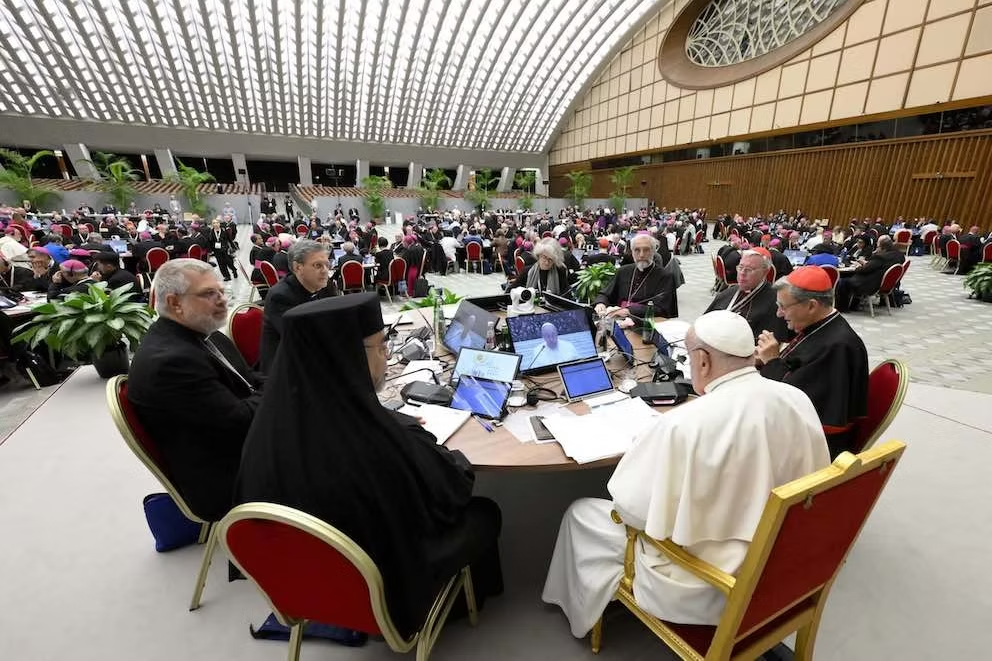focus | synodal journey
After the First Session of the Synod of Bishops Assembly
Adriana Masotti
What’s next on the journey?

Five Working Groups and a Permanent Forum
The two documents reflect the findings of the summary report from the first session, which itself was based on consultations conducted by churches worldwide. The new material collected will be used to draft the Instrumentum Laboris (working document) for the October Assembly, alongside theological insights developed by five working groups formed by the General Secretariat of the Synod, consisting of experts from diverse geographical backgrounds.
The groups are addressing the following themes:
1. The synodal and missionary character of the local Church.
2. The synodal and missionary character of groupings of Churches.
3. The synodal and missionary character of the universal Church.
4. The synodal method.
5. The “place” of the synodal Church in mission.
Additionally, the Synod Secretariat has decided to establish a “permanent forum” to support the broader synodal process by examining theological, canonical, pastoral, spiritual, and communication aspects of synodality in the Church. This will involve contributions from the International Theological Commission and a Canonical Commission. Progress on the work of this forum will be presented during the second session of the Synod Assembly.
The Church is Mission
“Rather than saying the Church has a mission, we affirm that the Church is mission,” reads the introduction to the first document. The focus of the effort requested from local ecclesial communities will therefore center on the theme of participation by all—in the diversity of vocations, charisms, and ministries—in the singular mission of proclaiming Jesus Christ and His Gospel to the world today.
The primary question, “How to be a Synodal Church in Mission?” aims to identify ways and tools to “value the uniqueness of every baptized person and every Church.” This question will also be addressed in terms of relationships between particular Churches and their relationship with the Bishop of Rome, “to find a dynamic balance between the Church’s overall dimension and its local roots.”
Ten Study Groups
The ten study groups, coordinated by relevant Dicasteries of the Roman Curia, will address issues that, as noted by Monsignor Piero Coda, Secretary General of the International Theological Commission, “cannot be directly and comprehensively addressed in the second session while remaining faithful to the commitment to answer the central question around which the Assembly has been convened.”
Here are the themes:
1. Relations between Eastern Catholic Churches and the Latin Church – promoting greater understanding and dialogue among their respective members, particularly in the context of increasing migration and diaspora.
2. Listening to the cry of the poor – including those marginalized, abused, and oppressed even within the Christian community.
3. Mission in the digital environment – examining theological, spiritual, and canonical implications of digital communication and the structural and organizational requirements for a digital mission.
4. Revision of the Ratio Fundamentalis Institutionis Sacerdotalis – in a synodal and missionary perspective. This 2016 document, published by the Dicastery for the Clergy, addresses priestly vocation and formation.
5. Theological and canonical questions regarding specific forms of ministry – reflecting on lay participation, recognizing and valuing women’s contributions, and exploring their increased pastoral responsibilities, including further theological and pastoral study on women’s access to the diaconate.
6. Revision of documents governing relations among bishops, consecrated life, and ecclesial movements – to better articulate their roles in service of communion and mission.
7. Aspects of the bishop’s role and ministry – focusing on criteria for episcopal candidate selection, the judicial function of bishops, and the nature of ad limina visits, informed by Pope Francis’s Motu Proprio Vos estis lux mundi on abuse cases.
8. The role of papal representatives – refining the service of Apostolic Nuncios and strengthening the bonds of communion between local Churches and the Pope.
9. Theological criteria and synodal methodologies for shared discernment on controversial doctrinal, pastoral, and ethical issues – clarifying the relationship between charity and truth, as well as doctrine and pastoral practice.
10. Reception of ecumenical progress in Church practices – to be explored at theological, canonical, and pastoral levels.
Pope Francis has determined that these study groups will provide an initial report of their activities at the October Assembly, with their mandate concluding by June 2025.
The Shared Mission of the Faithful
April to June 2024
No 23 – 2024/2

